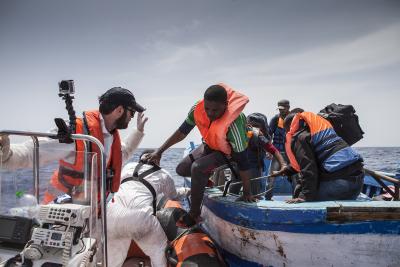The Changing Face of Humanitarian Intervention

Valletta - This month came the news came that the Migrant Offshore Aid Station (MOAS) will be extending their operations into the Aegean Sea and Southeast Asia.The focus is still primarily on the Mediterranean, where an estimated 75 percent of all migrant deaths happen. The news comes after a wave of widespread support for the NGO’s work in light of the growing media coverage of migrant issues.
Founded two years ago, the NGO has thus far saved 11,680 lives of children, women and men fleeing war-torn and impoverished countries. Their main rescue vessel, MY Phoenix, sails from the Valletta Grand Harbour in Malta. A number of medics, ex-military and maritime specialists make up their small and centralized team.
Moving into new territory is not a simple matter of applying the same model to a different area. “The cost of the operation varies, the types of fleets used may differ and political climates affect our operational plans. There are so many factors which come into play,” explains Christina Lejman, Fundraising Officer at MOAS. Despite political tensions and potential resistance, MOAS have high hopes for their upcoming rescue missions.
Central to MOAS’ success has been the support of Italian authorities who initiate and coordinate MOAS rescue missions. Once safely disembarked at Italian shores, governmental bodies such as Ministero Della Salute will meet the NGO at the port, taking over responsibility for the rescued migrants. Italy currently accepts more refugees than any other EU country.
“MOAS thanks the Italian authorities for assisting the rescues and taking the migrants to Italy, allowing the NGO to continue saving lives at sea” reads a statement on MOAS’ website. The NGO emphasizes that international cooperation is crucial if the EU is to find solutions for the crisis, echoing Matteo Renzi’s statement that every member state has a duty to help refugees.
In May this year, the Italian Navy conducted a migrant rescue operation of its own - and of its largest ever scale. Ten Italian vessels, four private boats and French ship acting on behalf of European Border Control Agency rescued migrants off the coast of Libya. The migrants were then taken to safer shores in Italy, mostly in Lampedusa.
“The country I represent, Italy, has saved countless human lives over the past months. I’d like to pay tribute to the women and men, both military and civilian, who even now are displaying solidarity and courage in keeping our fellow human beings alive,” said Renzi in a letter to The Guardian.
The Migrant Offshore Aid Station is the philanthropic brainchild of Italian-born Regina Catrambone and her American husband Christopher Catrambone. The Catholic couple, inspired by Pope Francis’ criticism of ‘global indifference’, poured their wealth and time into what was to become the first self-funded humanitarian organisation of its kind. Now operating as Director to MOAS is Martin Xuereb, Malta’s previous Chief of Defence.
Many Italians demonstrated their charitable nature when participating in this year’s Battle of Malta poker tournament, where MOAS raised funds and awareness for their work. “Well over 90 percent of the funds we receive are spent directly on saving lives...we keep our administration costs down to a bare minimum,” states the organisation.
There is much that other NGOs can learn from the success of MOAS. “What we’re showing is that it’s possible, it’s legal and it’s effective to do what we do. The concept has been tested in the long-run. We have shown that it’s no longer the sole responsibility of state-appointed actors to make a difference”, says Lejman, adding that one should “never underestimate the power of an informed and passionate public.”


